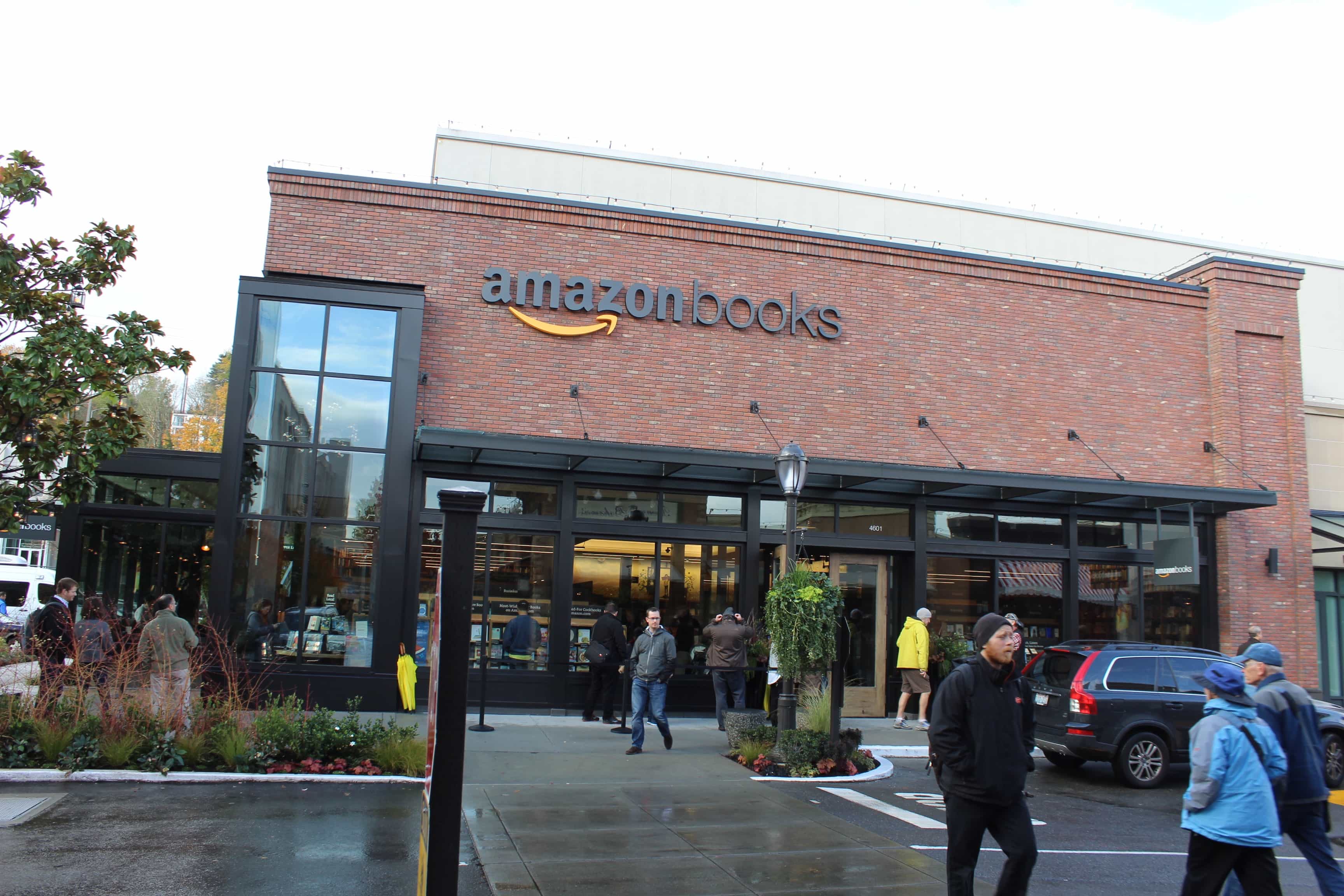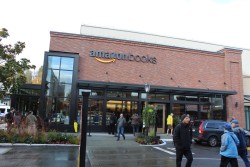Can’t Make it to Seattle to See Amazon Books? Ars Has the Next Best Thing

 Dozens of articles have been written about Amazon’s new bookstore in the 24 hours since it was formally announced. Most say pretty much the same thing (Amazon opened a store, yay/boo), but a couple articles stand out in the crowd.
Dozens of articles have been written about Amazon’s new bookstore in the 24 hours since it was formally announced. Most say pretty much the same thing (Amazon opened a store, yay/boo), but a couple articles stand out in the crowd.
The Atlantic’s coverage stood out because it was so awful, but Ars Technica’s thought piece stands out because this is the one and only article on Amazon’s bookstore that you simply must read. I’m still working my way through it for the second time, and I paused so I could tell you to go read it (and look at the 5 or 6 dozen photos).
Sam Machkovech writes like he is a snarky Amazon-hater, but he is also an incredibly observant one. He sees the store not as a bookstore so much as showfloor for all of Amazon’s services and products.
To name a few examples:
- the music is supplied by Amazon Music,
- there are Echos you can query,
- the magazine reading section is stocked with Fires, and
- users are prompted to install the Amazon shopping app for a complete experience.
I don’t know about you but I kinda got the impression from the earliest coverage that this was going to be a bookstore. Machkovech describes it differently:
Yet Amazon isn’t just interested in offering a comfortable, curated book-buying experience. It also wants to whack everybody over the head with its rapidly expanding empire of devices and content-delivery ecosystems. Everywhere you turn, you’ll find a Fire TV demo, or a table dedicated to Fire tablets, or the bonkers "read the book, listen to the book, watch the book" display—you know, in case you didn’t know that Amazon is ready to supply you with the audiobook and film versions of any hit franchise you can think of.
A few tables were dedicated to Amazon Echo, which we found hilarious, given that the white noise in the store was so loud, you couldn’t hear robo-Alexa’s spoken responses. Whenever Amazon Books turns on its speakers—they will exclusively play music from Amazon Prime Music—those demos will prove harder to hear.
Ultimately, the current version of Amazon Books is too busy, loud, and gadget-loaded to foster any traditional "let’s hang out at the bookstore to read and chat" experience. If you would rather think of the shop as a showroom for the Amazon products that have never been sold at big-box retailers like Best Buy or Wal-Mart, then that’s a whole 'nother story—but, then, why call the place "Amazon Books?"
This is the only first-hand report I’ve found so far, and it would be easy to misjudge the store based on what feels like a biased report. But I think it is safe to say that Amazon is using a "throw it against the wall and see what sticks" approach to the store.
In fact, I would say that this isn’t a bookstore or even a store so much as it is Amazon’s field experiment in retail.
If the pop-up stores Amazon tested in SanFrancisco, China, and Sacramento were lab experiments in retail, the Amazon Books in Seattle is the full blown field experiment where Amazon is closely studying the wildlife to see how it interacts with the the test equipment.
Then again, maybe I’m reading too much into this one report. The noise and confusion might be due to launch day craziness, and not a willingness to experiment. Once things quiet down and the excitement wears off, the store could look and feel different.
But at the moment, the store is described more like it was planned about as well as the Fire Phone and not nearly as well as the original Kindle.
There was also the odd matter of how much we interacted with humans. Amazon Books, in some ways, is designed to be a book-loving introvert’s dream: every book has a quote and a sales pitch, and every category shelf has been curated as if to say, "This is just like book stores of old! Look, some recommendations that are tailored for specific kinds of readers! You people used to love this stuff." Yet when we wanted to see about a specific book being in stock at the store, we couldn’t find any kiosk or app function to search locally, and that’s when we were told we needed to ask a human. (We asked this because we found a book that was a biography but not stocked in Amazon Books' biography section—which we consider another issue with the shop’s whole "let us curate for you" philosophy.) When Amazon Books didn’t have something in stock, an employee informed us—with no sense of irony—that you don’t have to "special order” it like at other book stores. Just order it through Amazon! You have the app open already, right?
What do you think?

Comments
Basem November 3, 2015 um 8:41 pm
It is a book-store, in a way, but not a conventional one. It is Amazon’s attempt to buttress their on-line presence through a physical store that showcases their different hardware and services; the goal is to sustain demand for these services (from the pictures I’ve seen, it appears that is the direction). In other words, this is the opposite strategy of a conventional book store like Foyles. There are some mistaken comments, which you read on-line, that observe an ironic twist that while Amazon actually sells books in physical stores, traditional sellers like B&N give toys and tablets predominance in their own stores (I’ve personally never been in a B&N store). I don’t think that is necessarily correct, as Amazon are using this store as an experiment to draw customers to buy on-line and not to morph into a traditional bookseller. May be it is similar to selling hardware as a conduit for Amazon Prime content; cutting edge hardware isn’t the point.
Basem November 3, 2015 um 8:51 pm
There also seems to be a problem that somehow shopping in physical stores is 'morally' superior to buying on-line. A lot of on-line commentary seems to get hung up on that and you get this resentment that how dare Amazon destroy all the competition and now they are after traditional booksellers (they aren’t in this case). Yes, Amazon practices are vicious and cut-throat but how is it different to any other tech giant? Didn’t B&N clear out their Nook division, sacking long-term employees? I just don’t like this moralising and it really diverts from the more significant issue on why these companies behave as they do.
fjtorres November 3, 2015 um 9:48 pm
There’s this ground level report:
http://www.thepassivevoice.com/11/2015/amazon-opening-its-first-real-bookstore-at-u-village/#comment-332603
I dropped in at about 4 o’clock. The place was packed. Reporters outside, preparing pieces for the evening news. Lots of hip Seattleites, young and old, in attendance. The place is very well designed, no surprise, with face-out displays and neat white-on-black cards with reader reviews below, a kind of material equivalent of the Amazon online experience. Long lines at the registers. I didn’t overhear a single snide remark. The place hummed with positive energy. The staff in particular (not all of whom were under 30) were jazzed with it.
fjtorres November 3, 2015 um 9:54 pm
I’m not sure launch day (/week/month) is the proper time to evaluate a new store of any kind. You need to wait til the novelty wears off.
If three months from now the place is too crowded and noisy to hear the Echo replies… well, Bezos would probably be delighted! 🙂
Nate Hoffelder November 4, 2015 um 9:44 am
@ Felix I have a second report that corroborates the Ars story and the comment you posted above.
Smoley November 5, 2015 um 10:21 am
I think the Seattle Public Library should make a phone application that would allow you to take a photo of a book on Amazon’s shelf in their new store and then tell you the nearest library branch where the book is available, and if not available, allow you to be added to the waiting list. Walk in, browse, get your books at the library and spend nothing!
Rob Siders November 5, 2015 um 11:33 am
I don’t think this is a "throw it against the wall and see what sticks" kind of thing. Nor am I particularly surprised that it’s as much—if not more so—a project to drive the brand than compete with other b&m bookstores. This doesn’t mean that it’s not experimental… it is. But I’m guessing a lot of research—from retail theory to decor to whatever—went into that shop.